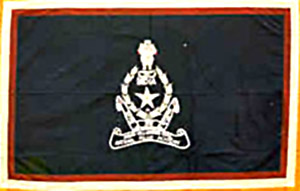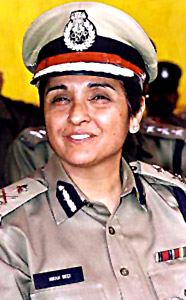 The Indian Police Service or IPS, is one of the three All India Services of the Government of India. The other two services are Indian Administrative Service (IAS) and the Indian Foreign Service (IFS).
The Indian Police Service or IPS, is one of the three All India Services of the Government of India. The other two services are Indian Administrative Service (IAS) and the Indian Foreign Service (IFS).
The Indian Police Service (IPS) replaced the Imperial Police (IP), immediately a year after India gained independence from Britain in 1948. One has to pass the Civil Services Examination or elevated from the state cadre to serve in the Indian Police Service. The Union Public Service Commission conducts this examination once every year. This examination is a common examination carried out for selection to the other one of the other All India Services, viz. the Indian Administrative Service, as well as various other Group A and Group B services under the guidance of Central Government. The enrolment examination for the third All India Service- the Indian Forest Service- is executed separately by the UPSC and this examination comprises of three stages.
The first stage of the examination consists of an objective type test called the Preliminary examination. This is a qualifying examination and only the candidates who clear this can sit for the next stage called the Main examination. In the Main examination each candidate should select two optional subjects, excluding which all candidates have to take a General Studies, Essay and compulsory language exam. The Main examination is a very thorough subjective type examination for which specific marks are awarded.
On the basis of the Main examination, a shortlist is prepared and these candidates can compete in the third and final stage of exam called the Viva voce or the Interview session. The marks of the Main examination and the Interview are added to prepare a final merit list of the finally selected candidates. The officers of the Indian Police Service (IPS) are trained at their best mainly at the Sardar Vallabhbhai Patel National Police Academy in the city of Hyderabad.
 The Police Act of 1861 still tallies with the Indian Police and the Indian Police Service exists since the Eighteen Hundreds. However, from 1996-2006 the reforms ordered by the Supreme Court was initiated by Prakash Singh, one of the former Directors General of Police of the States of Assam and subsequently Uttar Pradesh and finally DG of Border Security Force (BSF) appealed a Public Interest Litigation (PIL) in the Supreme Court of India. The PIL asked the court to investigate measures to improve the Police Forces across India in order to have proper rule of law and a notably improved protection across India. Several measures were taken immediately in order to train the police of India, true professionalism.
The Police Act of 1861 still tallies with the Indian Police and the Indian Police Service exists since the Eighteen Hundreds. However, from 1996-2006 the reforms ordered by the Supreme Court was initiated by Prakash Singh, one of the former Directors General of Police of the States of Assam and subsequently Uttar Pradesh and finally DG of Border Security Force (BSF) appealed a Public Interest Litigation (PIL) in the Supreme Court of India. The PIL asked the court to investigate measures to improve the Police Forces across India in order to have proper rule of law and a notably improved protection across India. Several measures were taken immediately in order to train the police of India, true professionalism.
The rules that were initiated in Indian Police service are as follows -
• A medium or high-ranking police officer cannot be transferred more frequently than 2 years.
• The state government will not ask the police force to employ someone nor can they select who the Chief Commissioner will be.
• There must be separate departments and staff for any kind of investigation and a separate unit for patrolling.
The PIL also brought about 3 new authorities in each state, to prevent political interference in Police and also to make the Police responsible for their heavy-handedness, which will include the formation of:
• A State Security Commission for policymaking and direction
• A Police Establishment Board, which will decide the process of selection, promotions and transfers of police officers and other staff.
• A Police Complaints Authority will be set up to inquire into allegations of police misconduct.
The Director of the Intelligence Bureau is the highest rank of the Indian Police Service and owns a badge with State Emblem above crossed sword and baton.
The other sub ordinate ranks in Indian Police Service are as follows -
| Director, Central Bureau of Investigation | Director General, Security |
| Director General, Central Reserve Police Force | Director, Special Protection Group |
| Director General, Border Security Force | Joint Directors, Intelligence Bureau |
| Director General, Central Industrial Security Force | Joint Director, Central Bureau of Investigation |
| Director General, Railway Protection Force | Director, Central Forensic Institute |
| Director General, Sashastra Seema Bal | Additional Director, SVP National Police Academy |
| Director General, Indo-Tibetan Border Police Force | Inspectors General, Central Reserve Police Force |
| Director, National Crime Records Bureau | Inspectors General, Border Security Force |
| Special /Additional Directors, Intelligence Bureau | Inspectors General, Central Industrial Security Force |
| Special /Additional Directors, Central Bureau of Investigation | Inspectors General of Police, State Police Forces |
| Director General, National Security Guards | Inspectors General of Police, Union Territories |
| Secretary (R), Cabinet Secretariat, Government of India | Deputy Inspector General of Police |
| Director General, Bureau of Police Research & Development | Superintendent of Police |
| Director General, Narcotics Control Bureau | Inspectors General, Indo-Tibetan Border Police |
| Director, Sardar Vallabhbhai Patel National Police Academy, Hyderabad | Director General, National Emergency Force & Civil Defence |
| Director, Bureau of Civil Aviation Security | Director General for the states of Andhra Pradesh, Assam, Bihar, Gujarat, Haryana, Himachal Pradesh, Jammu and Kashmir, Jharkhand, Madhya Pradesh, Karnataka, Maharashtra, Kerala, Orissa, Punjab (India), Tamil Nadu, Rajasthan, Tripura, Uttar Pradesh, Uttar |
| Commissioner of Police, Delhi | Commissioner of Police, Ahmedabad |
| Commissioner of Police, Kolkata | Commissioner of Police, Hyderabad |
| Commissioner of Police, Chennai | Commissioner of Police, Bangalore |
| Commissioner of Police, Mumbai | Commissioner of Police, Pune |
| Commissioner of Police, Nagpur |




















